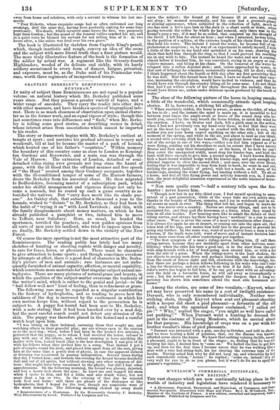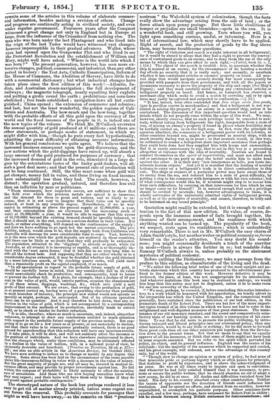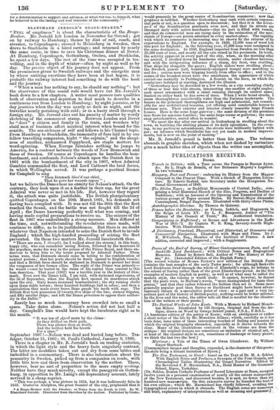II‘CULLOCH'S COMMERCIAL DICTIONARY, NEW EDITION. * Tam vast changes which are
now continually taking place in the worlds of industry and legislation have rendered it necessary to * A Dictionary, Practical, Theoretical, and Historical, of Commerce and C"Ik. mercial Navigation. Illustrated with Maps and Plans. By J. R. M'Culloch, Esq., Member of the Institute of France. A new edition, corrected and improved, Inth Supplement. Published by Longman and Co. rewrite some of the articles in this volume of elaborate commer- cial information, besides making a revision of others. Change and progress are continually acting in civilized society, and even under regular. government. Fourscore years after the Conquest witnessed a great change not only in England but in Europe at large, from the influence of the Crusades if from nothing else. The man who was born under the last Plantagenet and who lived into the reign of the last Tudor would have witnessed vast changes, however imperceptible in their gradual advances. Waller, whose eyes had opened upon the Gunpowder Plot and who lived to see the Protestant Revolution and the establishment of William and Mary, might well have asked, "Where is the world into which I was born ?" The present generation, however, has seen more ex- tensive changes, political, commercial, and industrial, than any other period in history : the Test Acts, Catholic Emancipation, Reform of the House of Commons, the Abolition of Slavery, have little to do with a commercial dictionary ; but what industrial changes have taken place since the first edition of this work !—Atlantic, In- dian, and Australian steam-navigation ; the full development of railways ; the magnetic telegraph, nearly equalling fairy exploits and putting a girdle round the earth ; prohibitions and corn-laws abolished; free trade established ; navigation-laws all but extin- guished; China opened ; the extension of commerce and colonies; and.last, but not the least wonderful, the golden regions of Cali- fornia and Australia. The how-much and the how-long, together with the probable effects of all this gold upon the currency of the world and the fixed incomes of the people in it, is indeed one of the new topics of the volume. We think Mr. M`Culloch overrates the annual quantity of gold produced at 47 millions ; and there are other statements, or perhaps modes of statement, in which we might differ with him,—though he puts every fact hypothetically, admitting the great difficulty of obtaining accurate information. With his general conclusions we quite agree. We believe that the increased business consequent upon the gold-discoveries, and the new nations which the gold-diggings have raised up, will absorb a large amount of the gold produced for purposes of currency ; that the increased demand of gold in the arts, stimulated in a large de- gree by the ostentatious tastes of the lucky gold-finders, will ab- sorb a good deal more; and that the present rate of production will not be long continued. Still, the time must come when gold will get cheaper, money fall in value, and those living on fixed incomes have substantially less than they had. The result, however, is distant ; the operation gradual, natural, and therefore less evil than an infliction by man or politicians. "These statements, how imperfect soever, are sufficient to show that the field over which the precious metals are spread is so immense, and the demand for them so great and various, and so likely to in- crease, that it is not easy to imagine that their value can be speedily reduced, at least in any sensible degree. Nevertheless, if we be war- ranted in estimating as above the present supply at 47,000,000/. a year, and their consumption (inc. an allowance for the increasing stock of coin) at 28,300,0001. a year, it would be idle to suppose that this excess of 18,700,0001. beyond the existing demand should be speedily balanced, or that it should not, in the end, occasion a serious decline in their value. But much, or rather everything, will depend on the continuance of the supply ; and here we have nothing to go upon but the merest conjecture. The pro- bability, indeed, would seem to be, that the supply both from California and Australia will increase for some considerable time to come. Vast, however, as is the area over which the gold deposits are scattered in these countries, still there can be little or no doubt that they will gradually be exhausted. The population attracted to the 'diggings' is already so great, while (in Australia, at all events) it is increasing so rapidly, and is so thoroughly im- bued with the 'and sacra fames,' that it bids fair in no very long time to rifle all the richest beds. And supposing that they are either wholly or to a considerable degree exhausted, it may be doubtful whether the gold obtained by a more laborious search, or by crushing quartz rocks, will yield more than a reasonable profit on the capital employed, if so much.
"In all speculations in regard to the probable future supply of gold, it i
should be carefully borne in mind, that any considerable fall n its value would unavoidably check its production' and, consequently, tend to lessen or prevent its further fall. It is plain, for example, that a decline of 10 per cent in the value of gold, would, eteteris paribus, occasion the abandonment of' all those mines, diggings, washings, &c., which only yield a nett profit of that amount. We are aware, that owing to the production of gold, as at present carried on, having more of a gambling character than pertains to most branches of industry, the principle now stated would not operate so speedily as might, perhaps, be anticipated. But of its ultimate operation there can be no question. And it may therefore be laid down, that any re- duction in the value of gold, which is not accompanied by a corresponding improvement in the methods of its production, inevitably tends to correct itself, or to cheek or hinder its further reduction.
"It is idle, therefor; where so much is uncertain, and, indeed, altogether unknown, to attempt to draw any conclusions entitled to much attention with respect to the probable future supply of the precious metals. But sup- Posing it to go on for a few years as at present, or not materially to decline, and that their value is in consequence gradually reduced, there is no good ground for apprehending that this reduction will have any injurious results. If it take place, it will be slow and will not suddenly affect the incomes or the position of. individuals. And we have elsewhere endeavoured to show, that the changes which, under these conditions, may be ultimately effected by a decline in the value of bullion, will, in a national point of view, be eminently desirable and beneficial. (Treatise on Taxation, 2d ed. p. 375- 387; see also an able article in the Asnerican Review, for October 1852.) We have seen nothing to induce us to change or modify in any degree this opinion. Some stress has been laid on the circumstance of the sums payable under life-insurances falling in value with a decrease in the value of money. But the great majority of people are, and all may be, insured in mutual in- surance offices, and may provide by proper investments against loss. No fall Within the compass of probability is likely seriously to affect the existing race of annuitants. And those who are now buying annuities know what they may expect ; and their heirs will have them only to blame if they do uot guard against probable contingencies." The stereotyped nature of the book has perhaps rendered it less easy to get rid of matter already printed, unless some cogent rea- son forces the removal. This probably accounts for passages that might as well have beerraway,—as the remarks on that- "precious
nostrum " the Wakefield system of colonization, though the facts really show the advantage arising from the sale of land ; or the fierce attack upon penny postage. But these little ebullitions of temper or prejudice are small blemishes—spots in the sun. It is a wonderful book, and still growing. Turn where you will, you light upon something curious, useful, or informing. Here is a bit of international law, which may shortly have to be applied. Right of search, and the protection of goods by the flag above them, may become troublesome questions.
" The right of visitation and search is a right inherent in all belligerents'; for it would be absurd to allege that they had a right to prevent the convey- ance of contraband goods to an enemy, and to deny them the use of the only means by which they can give effect to such right.—(Vatte/, book iii. e. 7, Sc 114.) The object of the search is twofold : first, to ascertain whether the ship is neutral or an enemy, for the circumstance of its hoisting a neutral flag affords no security that it is really such ; and secondly, to ascertain whether it has contraband articles or enemies' property on board. All neu- tral ships that would navigate securely during war must consequently be provided with passports from their government, and with all the papers or documents necessary to prove the property of the ship and cargo (See Ship's Papers) ; and they must carefully avoid taking any contraband articles or belligerent property on board. And hence, as Lampredi has observed, a merchant-ship which seeks to avoid a search by crowding sail or by open force may justly be captured and subjected to confiscation.—(§ 12.) " It has, indeed, been often contended that free skips snake free goods, (one le pavilion couvre la merchandise) and that a belligerent Is not war- ranted in seizing the property of an enemy in a neutral ship, unless it be contraband. The discussion of this important question would lead us into details which do not properly come within the scope of this work. We may, however, shortly observe, that no such privilege could be conceded to neu- trals, without taking from belligerents the right, inseparable from a state of war, of seizing an enemy's property if found in places where hostilities may be lawfully carried on, as on the high seas. In fact, were the principle in question admitted, the commerce of a belligerent power with its colonies, or other countries beyond sea, might be prosecuted in neutral ships, with as much security during war as in peace ; so that neutrals would, in this way, be authorized to render a belligerent more important assistance than perhaps they could have done had they supplied him with troops and ammunition. But it is surely unnecessary to say, that to act in this way is a proceeding altogether at variance with the idea of neutrality. Neutrals are bound to conduct themselves in the spirit of impartiality, and must not afford such aid or assistance to one party as may the better enable him to make head against the other. It is their duty non interponere se belle, non hoste im- minent° hostem eripere.' And yet it is manifest that the lending of neutral bottoms to carry on a belligerent's trade is in direct contradiction to this rule. The ships or cruisers of a particular power may have swept those of its enemy from the sea, and reduced him to a state of great difficulty, by putting a stop to his commerce with foreigners or with his own colonies ; but of what consequence would this be, if neutrals might step in to rescue him from such difficulties, by carrying on that intercourse for him which he can no longer carry on for himself? It is natural enough that such a privilege should be coveted by neutrals; but, however advantageous to them, it is wholly subversive of the universally admitted rights of belligerent powers, as well as of the principles of neutrality, and cannot, therefore, be truly said to be bottomed on any sound principle."
Quotation might readily be extended, but it is enough to call at- tention to the fact of this new edition. Its value, of course, de- pends upon the immense number of facts brought together, the clearness of their arrangement, and the readiness with which anything wanted can be turned up. The popularity of 'the book, we suspect, rests upon its readableness ; which is undoubtedly very remarkable. There is not in Mr. M'Culloch the easy charm of Adam Smith'sstyle, but no other writer on political economy soforces himself on the reader's attention. You may doubt his sound- ness; you might occasionally desiderata a touch of the suaviter in modo—there is always the fortiter in re ; but readable John Ramsay M'Culloch always is, unless probably on the abstrusest mysteries of political economy.
Before quitting the Dictionary, we may take a passage from the preface to this edition, as characteristic of the living and the dead. "We added the following brief notice of one of the most upright and pa- triotic statesmen which this country has produced to the advertisement pre- fixed to the former edition of this work. However defective it may be reckoned, the place, at least, was not unappropriata for its introduction. And whatever mutations this book may be destined to undergo, we would fain hope that this notice may not be displaced, unless it be to make room for one less unworthy of the subject. "'We may, perhaps, be excused, if, before concluding this notice introduc- tory to a work which he honoured with his approbation, we briefly advert to the irreparable loss which the United Kingdom, and the commercial world generally, have sustained since the publication of our last edition, in the premature death of Sir Robert Peel. There are but few of the more import- ant topics treated of in this volume in which we have not had to refer to the enlightened and well-digested measures of that great statesman. The main- tenance of our old monetary standard, and the sound and comparatively satis- factory state of our banking system, are mainly a consequence of his exer- tions. To say that he did more to promote the public wellbeing, by intro- ducing enlarged and liberal principles into our economical policy, than any other minister, would be to say little or nothing ; for he did more to forward these great ends than all our other ministers put together, from the Revolu- tion down to the present times. Not that we mean to say that we equally approve of all his measures, or think that some of them might not have been in some respects amended. But we refer to the spirit which pervaded his policy, its object, and its general influence. England was the centre of his solicitude ; but the majority of the measures which he supported and carried, and his great example, will redound, not to the advantage of this country only, but of the world.
"'Though slow to change an opinion or system of policy, he had none of that miserable pride or partisan bigotry which so often passes for principle, that disdains to profit by experience, and is above the acknowledgment of an error. He was at all times ready to inquire and open to conviction. And whenever he had fully satisfied himself that it was necessary, to pro- mote or secure the public welfare, that he should abandon an old or adopt a new.course, he did so at once. All doubts and difficulties vanished from his mind. His duty to his country absorbed every other consideration. Neither the taunts of opponents nor the desertion of friends could influenee his resolution. And he spared no efforts, and shrunk from no sacrifice, however unparalleled, to accomplish his patriotic purposes. Other ministers have equalled, and a few may, perhaps, have surpassed Sir Robert Peel in ability; but he stands foremost among British.statesmen for disinterestedness; and for a determination to support and advance, at whatever cost to himself, what he believed to be the lasting and real interests of the community.'"




































 Previous page
Previous page